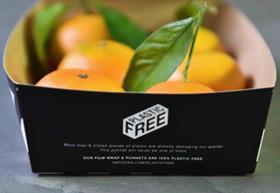
More than 60 per cent of the UK want business to take immediate action to tackle climate change and do more to help their customers ‘go green’.
A new national survey commissioned by sustainability charity WRAP shows that a majority of consumers believe companies across industry need to do more when it comes to tackling emissions to help the UK meet tough, binding environmental targets for 2050.
Whether it’s about plastic, food waste and water stewardship or greenhouse gas emissions, public perception is that there is a gap between businesses’ intentions and their actions. WRAP’s findings reveal this perceived inaction gap among consumers and show that the public want businesses to do more to tackle climate change.
The results reveal that 66 per cent of respondents feel businesses should do more to help their customers reduce their own impact on climate change, while a further 63 per cent agreed that businesses should act immediately on climate change.
Four in ten (42 per cent) said they thought UK businesses should have a clear step-by-step plan in place to reach their climate goals, and 41 per cent said businesses should be transparent on their targets as well as regularly publishing their progress so they can be held accountable.
When asked about specific sectors, 57 per cent said UK food businesses could or need to be doing more to tackle climate change and cut emissions.
The research also shows that when it comes to delivering change, collaboration is key in the opinion of consumers. The findings reveal 40 per cent believe UK businesses should be working with each other to tackle climate change issues within their sector or industry.
Dr David Moon, director of collaboration and change at WRAP,commented:“People are making it clear that they expect businesses to lead the way on tackling climate change and are prepared to walk away from brands if they don’t change.
“It’s also apparent that there is a willingness and desire for business to collaborate and work together on the best ways of combating climate change and guiding the UK along the path to ‘Net Zero’.
“Bringing down emissions and adapting to the concerns of customers should now be at the forefront of business thinking. Time is running out for companies to act.”
Unsurprisingly, Covid-19 has also had an impact on people’s purchasing habits, with exactly half agreeing that the pandemic had made them more likely to buy from brands that take positive social and environmental action.
With COP26 starting this week, WRAP is calling for more businesses to put plans into place to tackle climate change and reduce emissions by signing up to its Voluntary Agreements.
These collaborative change programmes are created to enable businesses to reduce their individual environmental impacts, and together drive sector-wide change in key areas of production and consumption.
They support businesses in setting targets, focusing on priorities, sharing insights, preparing for new taxes and regulations, measuring progress, testing new solutions, and accelerating systemic action across the whole product chain to reduce Scope 3 emissions (indirect emisisons that occur in a company's value chain).
WRAP’s Voluntary Agreements includeThe UK Plastics Pact,Courtauld Commitment 2030andTextiles 2030. These programmes are designed for businesses to address plastic pollution, water stewardship, carbon emissions and food waste, delivering the real change that the public is now demanding.
Those signed up toThe UK Plastics Pactinclude McDonalds, Tesco and Unilever and all are aiming for 100 per cent of the plastic packaging they use to be fully recyclable by 2025.
TheCourtauld Commitment 2030is a pan-industry agreement with manufacturers, retailers and food service businesses all working collaboratively to achieve key targets across food, emissions and water and to halve the UK’s greenhouse gas footprint by 2030.The ambition is to “keep 1.5 degrees alive”.



